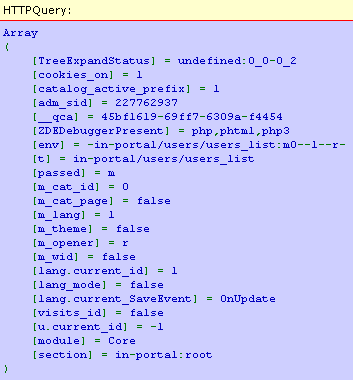K4:KHTTPQuery
From In-Portal Developers Guide
Path to article:
(Lang. side-box) |
|||
| Line 2: | Line 2: | ||
{| class="vertical-table" | {| class="vertical-table" | ||
| | | | ||
| - | [[Image:Http_query.gif|left|frame|none| | + | [[Image:Http_query.gif|left|frame|none|Content of register kHTTPQuery]] |
| | | | ||
The '''kHTTPQuery''' class is used in K4 for pre-proccessing and then to safely use the following types of data: | The '''kHTTPQuery''' class is used in K4 for pre-proccessing and then to safely use the following types of data: | ||
| Line 26: | Line 26: | ||
<source lang="php">env</source> | <source lang="php">env</source> | ||
| - | == User Variables | + | == User Variables defined from K4 == |
<source lang="php">module, section</source> | <source lang="php">module, section</source> | ||
| - | == | + | == Parsed Environment Variable == |
In this example, all the variables that aren't covered, are received as a result of processing the | In this example, all the variables that aren't covered, are received as a result of processing the | ||
[[K4:Environment|Environment Variable]]. It's easy to determine these variable because their names will contain an underscorce ("<code>_</code>"). | [[K4:Environment|Environment Variable]]. It's easy to determine these variable because their names will contain an underscorce ("<code>_</code>"). | ||
| + | |||
| + | [[en:{{FULLPAGENAME}}]] | ||
| + | [[ru:K4:KHTTPQuery]] | ||
Revision as of 18:46, 26 November 2010
| ||
|---|---|---|
| Статьи в этой категории | ||
|
|
The kHTTPQuery class is used in K4 for pre-proccessing and then to safely use the following types of data:
As far as user data, we're referring to the content of the following built in PHP arrays:
Also available are arrays $_ENV and $_SERVER, but right now they're not used in K4. |
Data Passed by the User (From the Browser)
For user data it's possible to include all variables received from built-in PHP arrays. In the image above, it would be the variables with the following names:
- From array $_COOKIE
TreeExpandStatus, cookies_on, catalog_active_prefix, adm_sid, __qca
- From array $_GET
env
User Variables defined from K4
module, section
Parsed Environment Variable
In this example, all the variables that aren't covered, are received as a result of processing the
Environment Variable. It's easy to determine these variable because their names will contain an underscorce ("_").



